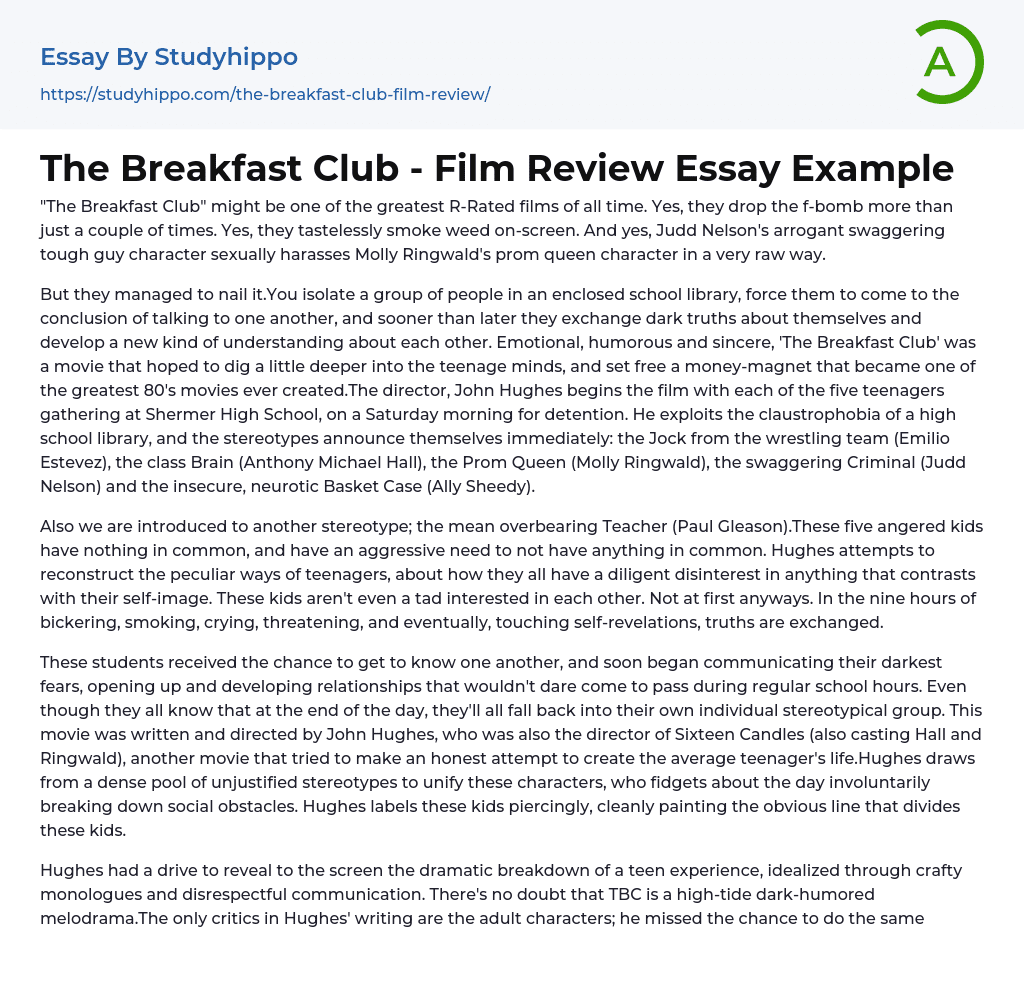"The Breakfast Club" is considered one of the most outstanding R-rated movies ever made, despite its use of foul language, depiction of drug use, and Judd Nelson's aggressive behavior towards Molly Ringwald's character.
Despite its simplicity, the movie 'The Breakfast Club' succeeded in deeply exploring the minds of teenagers. By confining a group of them in a school library and forcing them to talk, they uncovered their darkest secrets and gained a better understanding of each other. The film was emotional, humorous and authentic, and went on to become one of the most successful 80's movies. John Hughes, the director, cleverly used the setting of Shermer High School and its library to create a sense of claustrophobia, while playing on the well-known stereotypes of high school students: the jock (Emilio Estevez), the brain (Anthony Michael Hall), the prom queen (Molly Ringwald), the crim
...inal (Judd Nelson) and the basket case (Ally Sheedy).
Another stereotype introduced is the mean and overbearing Teacher (Paul Gleason). The five angry kids portrayed have nothing in common and are aggressively against having anything in common. The portrayal attempts to reconstruct how teenagers behave and their diligent disinterest in anything that goes against their self-image. Even though they show zero interest in each other at first, during the nine hours of bickering, smoking, crying, threatening, and eventually touching self-revelations, they reveal truths to each other.
During their time together, these students had the opportunity to bond, share their deepest fears, and form relationships that would never have developed during regular school hours. Despite knowing they will return to their respective social groups at the end of the day, they pushed past stereotypes and connected
on a deeper level. The film's writer and director, John Hughes, also directed Sixteen Candles (which starred Hall and Ringwald), a movie that aimed to realistically depict the lives of teenagers. Drawing from commonly held stereotypes, Hughes masterfully broke down social barriers and clearly defined the lines between these characters.
Hughes possessed a strong desire to portray on the screen the intense unraveling of a teenage experience, depicted through skillful monologues and irreverent communication. Undoubtedly, TBC is a darkly humorous melodrama at its zenith. The sole critics present in Hughes' writing are the adult characters, and he missed an opportunity to apply a similar approach to portraying stereotypes about adults through the character of Mr. Vernon, the Teacher.
Mr. Vernon's cruel nature almost seems comical, as he is solely focused on disdain for children. Author Hughes strives to delve into the teacher's psyche during a conversation between him and the janitor, Carl. However, during this exchange, they engage in a short philosophical discussion that seems extraneous to the plot.
Hughes initially intended to develop the character, but ultimately abandoned the idea after realizing that his intended audience was not interested in a non-stereotypical teacher. Notwithstanding, the film is a charming example of 80's cinema, achieving its goals with a beautiful and unassuming effort. At its core, the film explores themes of teenage communication and tentative friendships, culminating in a sincere message about society, often overlooked. Ultimately the fate of the five friends is left open for interpretation, dependent upon which stereotype one identifies with the most.
- Anorexia essays
- Breakfast essays
- Caffeine essays
- Chewing gum essays
- Child Development essays
- Chocolate essays
- Diet essays
- Dieting essays
- Eating essays
- Eating Habits essays
- Energy Drink essays
- Food essays
- Genetically Modified Food essays
- Genetically Modified Organisms essays
- Junk Food essays
- Metabolism essays
- Milk essays
- vegetarian essays
- Vitamin essays
- Weight Loss essays
- Anthropology essays
- Audience essays
- Charity essays
- Cultural Competence essays
- Emile Durkheim essays
- Gender Roles essays
- Generation essays
- Globalization essays
- Interpersonal Relationship essays
- People essays
- Race essays
- Social Change essays
- Social Class essays
- Social Movement essays
- Social Science essays
- Social Status essays
- Social Stratification essays
- Society essays
- Sociological Imagination essays
- Sociological Perspective essays
- Sociological Theories essays
- Stereotypes essays
- Web Dubois essays




